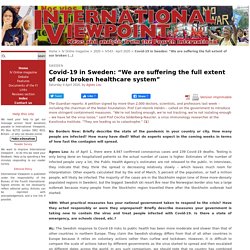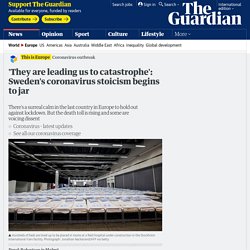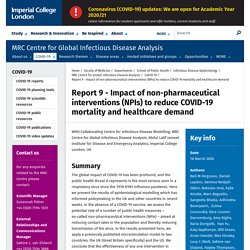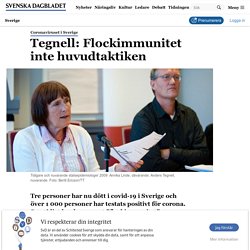

5/5/20: Dr. Anders Tegnell - Sweden’s Decision Not to Impose Quarantine. 4/27/19: Sweden Goes Its Own Way. 4/25/20: Coronavirus - Has Sweden got its science right? Sweden's strategy to keep large parts of society open is widely backed by the public.

It has been devised by scientists and backed by government, and yet not all the country's virologists are convinced. There is no lockdown here. Photos have been shared around the world of bars with crammed outdoor seating and long queues for waterfront ice cream kiosks, and yet it is a myth that life here goes on "as normal". On the face of it little has shut down. But data suggests the vast majority of the population have taken to voluntary social distancing, which is the crux of Sweden's strategy to slow the spread of the virus. Usage of public transport has dropped significantly, large numbers are working from home, and most refrained from travelling over the Easter weekend. Around 9 in 10 Swedes say they keep at least a metre away from people at least some of the time, up from seven in 10 a month ago, according to a major survey by polling firm Novus. 4/16/20: Sweden’s coronavirus strategy is risky and could backfire.
As most governments around the world impose strict social distancing measures to try to stop the spread of the coronavirus, Sweden has tried something quite different — and it’s unclear if it’ll prove successful or lead to more deaths.

For months, the Scandinavian nation allowed large gatherings to form, schools for younger children to remain open, restaurants to serve late-night guests, and resorts to welcome thrill-seeking skiers. Although some restrictions were in place and many people observed general safety and social distancing measures, Swedish health authorities felt it was better to have much of the country operating somewhat normally instead of shutting it all down. On a theoretical scale of activity, where most countries brought it down to zero in the hope of quickly ramping up to 100 again, experts say Sweden has tried to keep the country at a simmer of 30 to manage the crisis for months to come.
Whatever the true goal, Sweden’s strategy appears to be troubled. 4/7/20: Swedish scientists call for evidence-based COVID-19 policy. Sweden’s separate way of dealing, or rather of not dealing with coronavirus and COVID-19 pandemic has been widely criticised.

While the Swedish government seem to be slowly reconsidering its approach, some Swedish scientists decided to voice their protest about the current policy which they say will cost many lives. The authors of the following appeal are the Karolinska Institutet clinical epidemiologist Nele Brusselaers as well as biochemist Lynn Kamerlin from Uppsala and biophysicist Pernilla Wittung-Stafshede from Chalmers University of Technology. My readers will recognise Kamerlin as the organiser of the rather successful protest campaigns against the open access mandate of Plan S (read here, here and here). 4/4/20: “We are suffering the full extent of our broken healthcare system” No Borders New: Briefly describe the state of the pandemic in your country or city.

How many people are infected? How many have died? What do experts expect in the coming weeks in terms of how fast the contagion will spread. Agnes Lou: As of April 1, there were 4,947 confirmed coronavirus cases and 239 Covid-19 deaths. Testing is only being done on hospitalized patients so the actual number of cases is higher.
NBN: What practical measures has your national government taken to respond to the crisis? AL: The Swedish response to Covid-19 risks to public health has been more moderate and slower than that of other countries in northern Europe. Responses to the socio-economic situation have so far been meager compared to those of many other countries, except the government’s efforts to aid big business. 4/3/20: Experts criticise Swedish government for failing to prevent COVID-19 spread. By Jordan Shilton 3 April 2020 Public health authorities in Sweden announced limited social distancing measures this week in response to a rapid spread of COVID-19 cases across the country.

The measures, which remain much more relaxed than almost any country in Europe, were implemented after mounting criticism from medical experts of the Social Democrat-led government’s approach, which has been characterised as “herd immunity.” Workers are disinfected after cleaning a building for Covid-19. (AP Photo/Ted S. Warren) As of yesterday, there were at least 5,466 confirmed cases in the country and 282 fatalities. The Social Democrat/Green government has merely banned events of more than 50 people, while allowing all businesses to keep operating as normal. Sweden’s chief epidemiologist, Anders Tegnell, rejected claims that the authorities are pursuing a herd immunity policy. A petition signed by over 2,000 doctors, including the chairman of the Nobel Foundation, Prof. 3/30/19: 'They are leading us to catastrophe': Sweden's coronavirus stoicism begins to jar. The Øresund Bridge – yes, that bridge – is an engineering marvel linking the Swedish city of Malmö and Copenhagen that normally transports 70,000 people daily.

It has fallen eerily silent. Denmark is under coronavirus lockdown, and the Danes have imposed strict border controls. On the Swedish side, the Øresund remains open, although, understandably not many are making that journey. It feels surreal in Sweden just now. Working from my local cafe, I terror-scroll through Twitter seeing clips of deserted cities, or army trucks transporting the dead in Italy, surrounded by the usual groups of chatty teenagers, mothers with babies and the occasional freelancer. Outdoors, couples stroll arm in arm in the spring sunshine; Malmö’s cafe terraces do a brisk trade. The global pandemic has closed down Europe’s economies and confined millions of people across the continent to their homes.
The prime minister, Stefan Löfven, has urged Swedes to behave “as adults” and not to spread “panic or rumours”. 3/24/20: Greta Thunberg probably has(d) covid-19. Klimataktivisten Greta Thunberg och hennes pappa hade varit i Tyskland för en tv-inspelning med BBC.

När de kom hem lånade de en lägenhet för att kunna sätta sig själva i karantän. Och bara några dagar efter att de kommit till lägenhet började de märka av symptomen. Inte testad Greta skriver nu själv på Instagram att hon kände sig trött, fick ont i halsen och hostade för ungefär tio dagar sedan. Hennes pappa fick samma symptom men hade utöver det också feber.
3/21/20: Tegnell - our guide to the galaxy. 3/16/20: Impact of NPI's to reduce COVID-19 mortality and healthcare demand. 16 Mars 2020 - Imperial College London Rapport 9: Impact des interventions non médicamenteuses (INM) sur la réduction du taux de mortalité de la pandémie de COVID-19 et sur la demande en soins sanitaires Rapport de synthèse 9L’impact mondial du COVID-19 a été profond et la menace qu’il représente en matière de santé publique est la plus grave observée pour un virus respiratoire depuis la pandémie de grippe H1N1 de 1918.

Nous présentons ici les résultats de la modélisation épidémiologique qui a éclairé l’élaboration des politiques au Royaume-Uni et dans d’autres pays au cours de ces dernières semaines. En l’absence d’un vaccin contre la COVID-19, nous évaluons le rôle potentiel d’un certain nombre de mesures de santé publique, dites interventions non médicamenteuses (INM), visant à réduire les taux de contact au sein de la population et, par voie de conséquence, la transmission du virus.
3/15/20: Tegnell: Flock immunity not the main tactic. – Jag uppfattar att strategin från Folkhälsomyndigheten är att vi ska uppnå flockimmunitet, att så många som möjligt ska smittas och därmed bli immuna, utan att bli svårt sjuka.

Det gäller dock att sträcka ut infektionsförloppet och kapa toppen på antalet som blir sjuka samtidigt, för att underlätta vårdens arbete, säger Annika Linde till TT. Anders Tegnell, nuvarande statsepidemiolog, håller inte med. 3/14/20: Former state epidemiologist: "Slow dissemination can build up immunity"